

Gothic Literature: A Definition and List of Gothic Fiction Elements. In many ways, the Gothic novel is a direct response to eighteenth century ideals of formal realism, which is why it is essential to understand formal realism in order to understand Gothic literature.
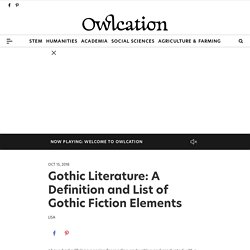
Formal realism is about creating a reality through the experience of one single character. It explores an individual's internal (rather than the external) drama and individual consciousness and perception. Furthermore, formal realism uses diction that is less elaborate and ornate than the literature of the past in order to reflect everyday life. Its overall goal is to educate the reader on both how to read and how to behave.
Dare to Scare: The Origins of Gothic Literature. In 1764, Horace Walpole introduced to the world a new genre of literature known as Gothic fiction.
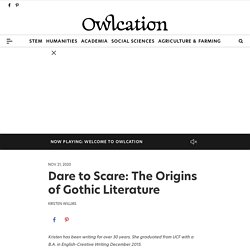
He employed elements of the supernatural as well as the everyday in a manner to strike fear into the reader. Though this was not the first time in literature that the supernatural was used in writing to a frightful effect; Shakespeare, for example, used King Hamlet’s Ghost in Hamlet and the three witches in Macbeth. This was the first time they were used for the purpose of terrifying its audience. Gothic Literature Study Guide. Nothing makes you feel more alive than getting a good scare by a horror story! Gothic Fiction has a long history, and remains popular to this day. We hope this guide is particularly useful for teachers and students to explore the genre and read some great stories.
Lifting the lid on Gothic Literature. Transcript Transcript.
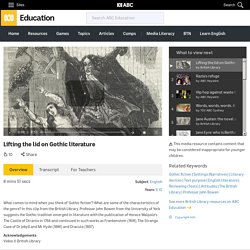
Gothic Literature. C. 1764 The Gothic, a literary movement that focused on ruin, decay, death, terror, and chaos, and privileged irrationality and passion over rationality and reason, grew in response to the historical, sociological, psychological, and political contexts of the late eighteenth and early nineteenth centuries.
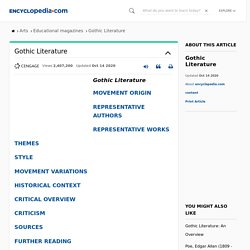
Although Horace Walpole is credited with producing the first Gothic novel, The Castle of Otranto, in 1764, his work was built on a foundation of several elements. First, Walpole tapped a growing fascination with all things medieval, and medieval romance provided a generic framework for his novel. Jane Eyre- Fairytale and Realism. Transcript Transcript 00:00:00:00Logo of British Library.00:00:01:00Pages of an open novel.00:00:02:00Illustration of Bluebeard.00:00:03:00Title - Jane Eyre - Fairytale and realism00:00:04:10Professor John Bowen, University of York, sits in the Bronte Parsonage.00:00:42:15PROFESSOR JOHN BOWEN:So, Jane Eyre, in lots of ways, borrows from fairytales and folktales.
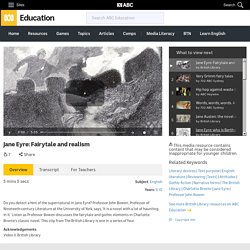
The Lost and the Missing at Hanging Rock. Transcript Transcript JOAN LINDSAY, 1978Picnic At Hanging Rock really was an experience to write, because I was just impossible when I was writing it.

I know I just sort of thought about it all night long, and in the morning I would go straight up to the little room upstairs, sit on the floor, papers all around me like that, and just write like a demon.Extract of the filmGIRLDon't worry about us, mademoiselle. We shall only be gone a little while.JOAN LINDSAYIt's an extraordinary thing to me that people are not content to leave it as a mystery. Robert Louis Stevenson. Robert Louis Stevenson is best known as the author of the children’s classic Treasure Island, and the adult horror story, The Strange Case of Dr.
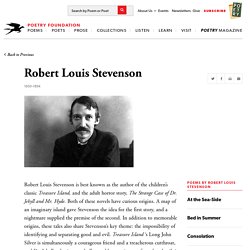
Jekyll and Mr. Hyde. Both of these novels have curious origins. Jane Austen's World. Jane Austen and the Gothic Novel - Lynn Shepherd. 24 October 2012 It’s generally agreed that the first Gothic Novel was Horace Walpole’s Castle of Otranto of 1764.
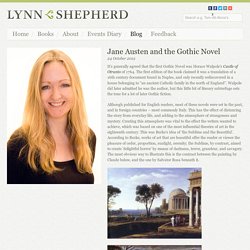
Emily Brontë – author of Wuthering Heights. Biography Best-known for her novel Wuthering Heights (1847), Emily Brontë also wrote over 200 poems which her sister Charlotte Brontë thought had ‘a peculiar music – wild, melancholy, and elevating’.
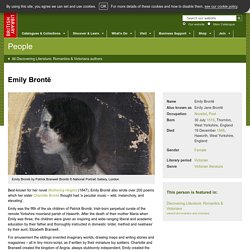
An introduction to Ann Radcliffe. Mary Wollstonecraft Shelley. The most eloquent summary of Mary Wollstonecraft Shelley's position in English letters is still Leigh Hunt's much-quoted couplet from "The Blue-Stocking Revels": "And Shelley, fourfam'd,—for her parents, her lord, / And the poor lone impossible monster abhorr'd.
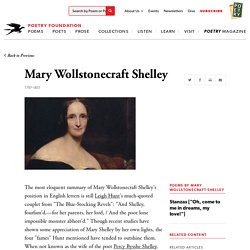
" Though recent studies have shown some appreciation of Mary Shelley by her own lights, the four "fames" Hunt mentioned have tended to outshine them. When not known as the wife of the poet Percy Bysshe Shelley, she is recognized as the daughter of the celebrated radical writer Mary Wollstonecraft and the equally well-known novelist and political philosopher William Godwin. Even the sole recognition won by her own efforts, the "monster abhorr'd" of her great novel Frankenstein (1818), is tainted by popular associations with stage and cinema versions of the monster which have little to do with her "Modern Prometheus.
" Edgar Allan Poe. Edgar Allan Poe’s stature as a major figure in world literature is primarily based on his ingenious and profound short stories, poems, and critical theories, which established a highly influential rationale for the short form in both poetry and fiction. Regarded in literary histories and handbooks as the architect of the modern short story, Poe was also the principal forerunner of the “art for art’s sake” movement in 19th-century European literature. Whereas earlier critics predominantly concerned themselves with moral or ideological generalities, Poe focused his criticism on the specifics of style and construction that contributed to a work’s effectiveness or failure. In his own work, he demonstrated a brilliant command of language and technique as well as an inspired and original imagination. Rebecca (1979) S01E01 BBC series. Rebecca - 1940 Movie CLIP - 'It's Gone Forever'